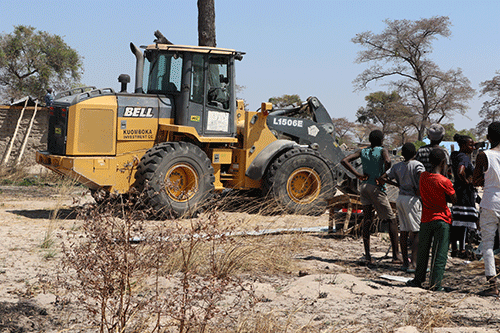Albertina NakaleMaihapa Ndjavera
The Katima Mulilo Town Council is adamant the demolishing of houses two weeks ago was necessitated by the continuous refusal of illegal land occupiers to be relocated to a demarcated site.
Although the demolition some two weeks ago was heavily criticised by some, including political parties, the council has come out in defence of its recent eviction order in the Lwanyanda informal settlement.
A deputy sheriff was appointed by the High Court, specifically for this exercise, which started with the enforcement of the court order, by giving 10 days notices to the land occupants.
After the expiry of the 10 days, a grace period of four days was given, which expired on 7 September 2022, before the demolition happened two weeks ago.
In reaction to the evictions, Landless People’s Movement human rights leader Joyce Muzengua said forced evictions in Namibia is another nightmare the urban poor are faced with.
“This comes as a consequence of cumulative failure of planning and forecasting in local authorities. The lack of planning in local authorities result in the nightmare of forced evictions due to the influx of urban migrations,” she said yesterday during a media briefing.
However, Katima Mulilo mayor Lister Shamalaza yesterday explained meetings were conducted from 2017 to 2022 together with the former councillor for Katima Mulilo Urban to try and talk to the illegal land occupants to willingly move.
However, he said these meetings always ended without any solutions.
The occupants claimed to have acquired the land from the traditional authority and that the land in question was never the council’s but rather belonged to the traditional authority.
It was for this reason that in 2019, council engaged with the traditional authority to clear the ownership of the disputed land.
It was found that the land did not belong to the traditional authority but rather to the council.
Shamalaza indicated an agreement was signed in this regard between Katima Mulilo Town Council and the traditional authority and was witnessed by the then Minister of Urban and Rural Development Peya Mushelenga, among other senior national leaders.
Muzengua said local authorities often connive with property developers and sell land that is already occupied by residents.
In this regard, LPM calls for human rights attorneys to put domestic courts to task so that this practice can be put on halt.
The council entered into a joint venture with Kayuni Investments CC (Green Valley Development) and Shikuh Investments CC back in 2015-16 for the developers to build middle and high-income houses for the residents who expressed their willingness to acquire houses.
All statutory procedures with regard to the registration of the land have been completed.
Between 2016 and 2017, land grabbing at Katima Mulilo escalated at an alarming rate in all corners of the town.
Some of the land grabbed was already offered to the developers.
The developer in 2017/18 started with the construction of bulk services on the land but couldn’t do so due to settlers.
After numerous communications and meetings with these land grabbers between 2019 and 2020, the council and Kayuni Investments CC engaged its lawyers to acquire a court order to evict the land grabbers to pave way for the planned development.
“After the court order was obtained in October 2020, the council again spent some time trying to communicate the court order to the land grabbers but these land grabbers were uncooperative and violent. This can be attested by videos of the same land grabbers circulating on social media insulting the mayor of the town and that they did not want anything to do with the town council,” he charged.
A sheriff was appointed by the court to deliver the order as well as to enforce it at the same time.
However, Shamalaza said the appointed sheriff was met with resistance and threats from the occupants.
In fact, he mentioned the council set up a relocation area, known as Nova, for these illegal land occupants to be relocated there.
The developer Kayuni Investment CC, donated some materials to the council for an amount of N$79 000, the Office of the Prime Minister also donated materials for an amount of N$350 000 to construct water infrastructure at Nova relocation area.
At the time, most illegal occupants from Lwanyanda agreed to move to Nova, but 16 refused to move and remained at Lwanyanda.
In an effort by the council to engage the remaining 16 to willingly move to Nova, he pointed out they resisted and instead started selling and allocating plots by allegedly deceiving people that the court order will never be enforced and that they should come back and stay.
“The number started growing again from 16 to more than 50. In May 2022, another Sheriff was appointed to enforce the court order against the illegal land occupants but was met with serious resistance in delivering this court order and he eventually resigned,” the mayor said.
Muzengua further said in international law, the right to adequate housing contains freedom: “These freedoms include the protection against forced evictions and the arbitrary destruction and demolition of one’s home, and the right to choose one’s residence to determine where to live and to freedom of movement.”


